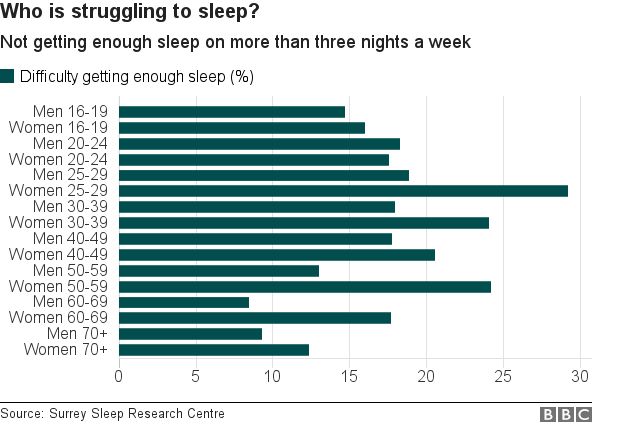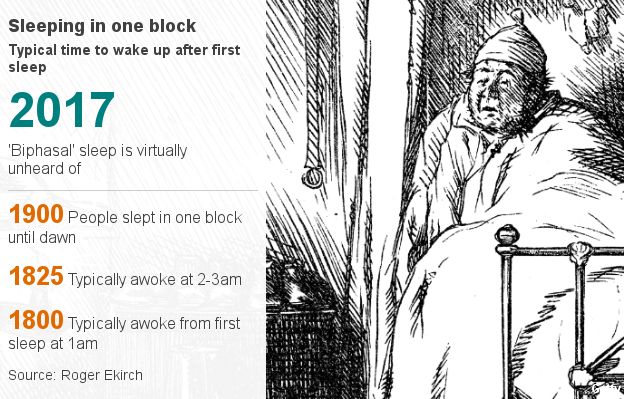10 things to know about sleep as the clocks go back
5. And many of us are feeling more sleep deprived than ever
To judge from media reports, you'd think we were in the grip of a sleeplessness epidemic. But are we really all more sleep deprived than before?
A big piece of research looking at data from 15 countries found a very mixed picture. Six showed decreased sleep duration, seven increased sleep duration and two countries had mixed results.
Lots of a evidence suggests the amount we sleep hasn't changed that much in recent generations.
But if you ask people how sleep deprived they think they are, a different picture emerges.
So why do so many people report feeling tired?
It may be that this problem is concentrated in certain groups, making the trend harder to pick up on a population-wide level.
Sleep problems vary considerably by age and gender, according to one study of 2,000 British adults. It found women at almost every age have more difficulty getting enough sleep than men.
The sexes are more or less level at adolescence but women begin to feel significantly more sleep deprived than men during the years where they may have young children, while work may become more demanding. The gap then shrinks again later in life.

Caffeine and alcohol both affect sleep duration and quality.
And later nights and more social activities mean some of us are getting less rest, despite having the same number of hours of sleep, according to Prof Derk-Jan Dijk, of the University of Surrey's sleep research centre.
Some people may also sleep too little during the week and catch up at the weekend, bringing the average up but leaving those people feeling sleep deprived.
For example, adolescents are particularly at risk of becoming sleep deprived, according to Prof Dijk.
6. But we didn't necessarily always sleep this way
Aside from a few outliers - Margaret Thatcher could apparently get by on only four hours a night - people tend to go to bed in the late evening for around seven or eight hours.
But this wasn't necessarily always the norm according to Roger Ekirch, a history professor at Virginia Tech in the USA. He published a paper in 2001 drawn from 16 years of research.

His subsequent book, At Day's Close, contained a wealth of historical evidence suggesting that hundreds of years ago, humans in many parts of the world slept in two distinct chunks.
Dr Ekirch uncovered more than 2,000 pieces of evidence in diaries, court records and literature which suggest people used to have a first sleep beginning shortly after dusk, followed by a waking period of a couple of hours, then a second sleep.
He thinks this means the body has a natural preference for segmented sleep.
Not all scientists agree. Other researchers have found hunter-gatherer communities in the modern world who sleep in one block despite not having electric lighting. This suggests sleeping in two blocks is not necessarily our default.
According to Dr Ekirch the shift from biphasal to monophasal sleep happened in the 19th Century because domestic lighting pushed bedtimes later with no corresponding change in rising time, improved lighting changed the human body clock, and the industrial revolution put a greater emphasis on productivity and efficiency.
...[ Continue to next page ]
Share This Post





